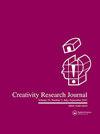Towards Game-Based Assessment of Creative Thinking
IF 2.5
3区 心理学
Q2 PSYCHOLOGY, EDUCATIONAL
引用次数: 0
Abstract
ABSTRACT For decades, researchers have struggled with measurement problems related to the construct validity of divergent and convergent thinking in creativity assessments. In response, some have called for battery-based approaches. Recently, digital games have emerged as a potential alternative, offering increased scalability and improved ecological validity. This article presents CREA: a new, scalable, game-based assessment suite. CREA includes crea.tiles and crea.blender, non-verbal games featuring both divergent and convergent thinking modes, as well as crea.ideas – the Alternative Uses Task, a standard test of divergent thinking, and crea.logic – a test of abstract reasoning. The novel convergent and divergent thinking game modes are constructed within the same contextual environment and with theoretically motivated differences in game-prompts to understand and generalize from the emerging elicited behaviors. In this study, 408 participants completed the CREA suite and selected validation measures, representing the largest game-based validation study to date. Both convergent and discriminant validity is demonstrated for crea.tiles with respect to standard tests, with correlations ranging from r = .1–.4. Having CREA freely accessible, we aim to broaden the accessibility of creativity assessment to researchers, educators, and the general public and through this scaleup validate the rich creative behavioral patterns observed in this study. Plain Language Summary Creative thinking is an essential attribute for success in the 21st century, yet it is difficult to measure because it is complex and contextual. Traditional pen and paper tests of creative thinking are the status quo and are backed up by years of research; however, there are well-known issues with these tests such as (1) they are difficult to scale up, as they require expert human-raters to evaluate the responses; (2) many of them are verbal, which is not necessarily fair within a culturally and linguistically diverse population; and (3) there are still fundamental open questions about what they actually measure. Digital, game-based creativity assessments represent an emerging alternative to conventional creativity tests, presenting the potential for increasing scalability and improving the quality of the results. This article presents CREA: a new, scalable, suite of game-based assessments. CREA includes crea.tiles and crea.blender - non-verbal games featuring several game modes, as well as crea.ideas - a standard test of divergent thinking, and crea.logic - a test of abstract reasoning. Participants (n=408) were university students from North America. They completed the CREA suite and a series of validation measures. The results from the study indicate that the current, freely accessible, version of the CREA suite demonstrated sufficient validity to be used by researchers and practitioners as a scalable, creativity assessment instrument for automated figural assessment of divergent and convergent thinking.基于游戏的创造性思维评估
本文章由计算机程序翻译,如有差异,请以英文原文为准。
求助全文
约1分钟内获得全文
求助全文
来源期刊

Creativity Research Journal
Multiple-
CiteScore
5.10
自引率
7.70%
发文量
52
期刊介绍:
Creativity Research Journal publishes high-quality, scholarly research capturing the full range of approaches to the study of creativity--behavioral, clinical, cognitive, crosscultural, developmental, educational, genetic, organizational, psychoanalytic, psychometrics, and social. Interdisciplinary research is also published, as is research within specific domains (e.g., art, science) and research on critical issues (e.g., aesthetics, genius, imagery, imagination, incubation, insight, intuition, metaphor, play, problem finding and solving). Integrative literature reviews and theoretical pieces that appreciate empirical work are extremely welcome, but purely speculative articles are not published. Readers are encouraged to send commentaries, comments, and evaluative book reviews.
 求助内容:
求助内容: 应助结果提醒方式:
应助结果提醒方式:


